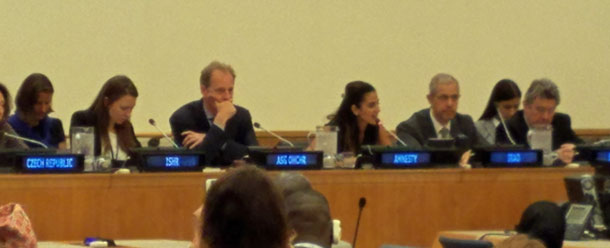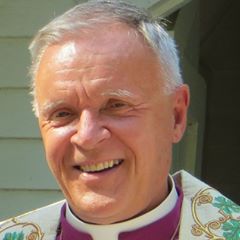What's at stake in U.N. Human Rights Council election

U.N. Human Rights Council elections:
Why they are important to the international LGBT movement

Around 130 people gathered in a brightly lit mid-century conference room at the United Nations in New York on Monday, 11th September, at the invitation of the International Service for Human Rights (ISHR). Other sponsors included Amnesty International, the Czech Republic and Iraq. The meeting was chaired by Andrew Gilmour, U.N. assistant secretary-general for human rights.
The meeting’s sponsors had invited representatives of countries seeking election onto the Human Rights Council to present their reasons for their candidacy and to hear from civil society.
Every year, a third of the available seats on the Human Rights Council (47 seats in all) are up for grabs. Some of the most notorious countries who allow human rights violations, serve on this august body. But that does not render the council meaningless. Many activists see such countries’ membership as a serious matter that could allow these nations’ human rights failures to see the light of day and perhaps even be corrected.
The body’s most influential carrot is the annual process where a third of U.N. member nations undergo a Universal Periodic Review (UPR) often detailing human rights abuses and failures in economic, cultural and religious institutions so they can be named and, in some cases, remedied.
The Council has also relied on a network of internationally recognized independent special rapporteurs/experts with cross-cutting themes. (For example, the special rapporteur on extrajudicial, summary or arbitrary executions; the special rapporteur on the rights to freedom of peaceful assembly and of association; the special rapporteur on refugees, etc. — a total of at least 38.) No country wants to get a bad report from any of them. The transparency of the U.N. systems has allowed countries the ability to discuss their shortcomings openly and the possibilities for making amends to marginalized and persecuted communities.

The focus on women’s and indigenous people’s issues in the Sustainable Development Goals underscore this momentum. Along those lines, it’s worth mentioning last year’s first-ever U.N. Security Council discussion related to sexual minorities. The outcome of that discussion — the 2016 condemnation of violence towards LGBTI people as a result of the Orlando massacre — shows another important direction the Council may be taking: Costly wars and other conflicts could be prevented if human rights abuses by governments are somehow nipped in the bud earlier.
A number of ambassadors who came to the ISHR meeting made the case for their country’s candidacy by pushing for greater commitment to human rights by all U.N. agencies, including the U.N. Security Council. This is a new role for the U.N.’s most elite body.
The ambassador from Afghanistan talked about the impact of losing 70-80 people a day through terror-related violence and how to protect the human rights of his people under these traumatic conditions. There was a key discussion on immigration and refugees and what each country has been doing to alleviate the plight of people coming to their countries.
LGBTI issues were specifically mentioned by Nepal, Australia and Mexico but it remains an issue that either is low on national priority lists because of larger issues like refugees, or it is simply opposed for religious or cultural reasons. All these emerging pressures and foci underscore the vital importance of this Council’s work and why countries are seeking election to it to shape its future.

For LGBTI people in particular, the Human Rights Council has been an un-fogged lens to look more deeply into the systemic, governmental and religious abuse of LGBTI people in close to 80 countries where we remain criminalized and largely invisible.
Attempts to exclude LGBTI economic and health indicators during the prioritization of the Sustainable Development Goals in the past two years, sadly, have been successful. Against this background, it was amazing that the UN agreed to create the special position of the Independent Expert on the Prevention of Violence and Discrimination based on Sexual Orientation and Gender Identity last year. The discussions about that position were uncivil. That six-year appointment was approved — barely — on a vote 28 in favor, 18 against and 6 abstentions.
Some of the countries opposing the creation of that position are now running for election to the council, including Qatar, Nigeria and Congo. Our meeting was used by the U.S. delegation to condemn countries that have poor human rights records and refuse to show up to meetings like this one.
The panel of candidate nations were asked if compulsory attendance at these kinds of forums would be acceptable. There seemed to be no doubt that this would be an important evolution from the current system.
It is reported that Congo has some of the worst rape statistics in the world — over 400,000 reported cases. Yet the government has supported impunity for rapists because of the ongoing armed conflict there. If Congo earns a seat on the U.N. Human Rights Council, that would be outrageous.
Like Congo’s, the U.N. delegation from Nigeria also did not show up to the meeting. Nigeria has only ratified 5 out of 14 mechanisms or treaties that concern international human rights issues.
South Africa abstained in that 2016 crucial vote on the independent expert’s position, so even LGBTI-friendly countries cannot always be counted upon to do the right thing when we need them to.
Elections to the U.N. Human Rights Council will be held at the General Assembly next week.
Vitit Muntarbhorn

Many of us were saddened to hear the elementary work of the present Independent Expert, Mr. Vitit Muntarbhorn, will be cut short because of the recent announcement he will resign from his position at the end of October because of family and health issues.
The position, although new and precarious, will need to be filled by someone who understands both the complexity of the U.N. systems and has a high level of experience internationally to ensure the work can be integrated to other U.N. priority concerns. Because LGBTI issues remain invisible in the Sustainable Development Goals, there will need to be some extra collaboration with other accountability mechanisms to ensure we are represented across these goals. The case still needs to be made to influential institutions like the World Bank and the International Monetary Fund that LGBTI people are among the most marginalized and impoverished minorities on the planet.
For comparison, consider last year’s timely appointment of Cliff Cortez as the World Bank’s internal LGBTI expert. Cliff brings 20 years experience of working within the U.N. itself, so he knows how to get the attention of the economists and bureaucrats who are still not convinced we should even be at the conference table. Mr. Muntarbhorn’s successor will need the same respected credentials.
We have the next six years to make our case before the hawks circle again to try to jinx the post entirely. ISHR’s recent report on the difficulty and significance of this new appointment is expressed in their annual report:
“The first attacks came at the Human Rights Council in June. Unsuccessful there, negative forces regrouped to mount a campaign to discontinue the mandate at the Third Committee and the Plenary of the UN General Assembly in November and December. Defeated again, a last-ditch attempt was made on the eve of the new year to starve the mandate of resources through the General Assembly’s Fifth Committee.
“That the resolution was adopted, the mandate established and the resources allocated is a testament to the power of a positive vision, the principled leadership of a group of progressive Latin American States, and the careful documentation of LGBTI rights violations by Special Rapporteurs and the UN High Commissioner for Human Rights.
“The victory owes most, however, to the bravery and tenacity of LGBTI rights activists worldwide and the unprecedented mobilization of more than 870 grass-roots NGO’s from 157 countries from every region of the world. ISHR, OutRight Action International, ILGA and ARC International played key roles in this mobilization and coordination of the landmark campaign in Geneva and New York.”
The countries standing for election are: Afghanistan, Angola, Australia, Chile, Congo, Malaysia, Mexico, Nepal, Nigeria, Pakistan, Peru, Qatar (represented, incidentally, by the only woman delegate who spoke at the meeting), Senegal, Slovakia, Spain, and Ukraine. You can read about the effects of LGBTI discrimination or progress in any of these countries through the Erasing 76 Crimes blog. There is also an excellent scorecard prepared by ISHR on the human rights records of these countries that you can read in more detail here.
The Rev. Canon Albert Ogle is Executive Director of the St. Paul’s Foundation for International Reconciliation and is based in new York where he also serves an Episcopal Church congregation. You can read more about the work of the foundation and support its international work here.
Related articles:
- Anti-LGBT nations seek to end U.N. advocacy of LGBT rights (November 2016, 76crimes.com)
- A Plea to the African Group at the 71st Session of the UN General Assembly (November 2016, Anthony-Oluoch.com)
- African States sell out LGBT Human Rights in bid to end role of UN Expert (November 2016, O-blog-dee blog)
- U.N. approves LGBTI rights watchdog (June-July 2016, 76crimes.com)
- Iran pushes ‘Islamic human rights’ excluding LGBT people (June-July 2016, 76crimes.com)
- Iran rejects U.N. plea to stop abuse of LGBTI youths (February 2016, 76crimes.com)





There is a serious human rights violation going on in South Korea with the unlawful detention, and
and …?